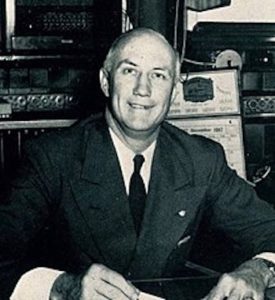
Strom Thurmond Sr.
*Strom Thurmond Sr. was born on this date in 1902. He was a white-American racial segregationist, lawyer, teacher, judge, and politician.
James Strom Thurmond was born in Edgefield, South Carolina, the son of Eleanor Gertrude and John William Thurmond, a lawyer. His ancestry included English and German. When Thurmond was five, his family moved into a larger home with about six acres of land, where John Thurmond thought his sons could learn more about farming. Young Thurmond rode ponies, horses, and bulls from an early age, and his home was frequently visited by politicians and judges who would follow his father back to the house.
At six years old, Thurmond encountered South Carolina Senator Benjamin Tillman, who questioned why he would not shake his hand when the two were introduced to each other by Thurmond's father. Thurmond remembered the handshake as the first political skill he had learned and continued the pattern of greeting with a handshake throughout his career. He attended Clemson Agricultural College of South Carolina (now Clemson University), where he was a Pi Kappa Alpha fraternity member. Thurmond graduated in 1923 with a degree in horticulture.
Soon after, he impregnated Carrie Butler, a 16-year-old Black girl who had been working as his family's maid. After college, Thurmond worked as a farmer, teacher, and athletic coach until 1929, when, at age 27, he was appointed Edgefield County's superintendent of education until 1933. Thurmond studied law with his father as a legal apprentice and was admitted to the South Carolina bar in 1930. He was appointed Edgefield Town and County attorney from 1930 to 1938.
In 1933, Thurmond was elected to the South Carolina Senate and represented Edgefield until he was elected to the Eleventh Circuit judgeship. Thurmond supported the 1932 presidential campaign of Franklin D. Roosevelt, favoring Roosevelt's argument that the federal government could be used to assist citizens in their daily plights. Thurmond raised money for Roosevelt and attended Roosevelt's inauguration following Roosevelt's victory over President Herbert Hoover.
He ran for president in 1948 as the States Dixiecrat Party candidate, receiving 2.4% of the popular vote and 39 electoral votes. Thurmond represented South Carolina in the United States Senate from 1954 until 2003 as a Southern Democrat and, after 1964, as a Republican. In opposition to the Civil Rights Act of 1957, he conducted the longest speaking filibuster by a lone senator for 24 hours and 18 minutes. In the 1960s, he opposed the civil rights legislation to end segregation and enforce the constitutional rights of African American citizens, including suffrage.
A controversial man during his nearly half-century Senate career, Thurmond switched parties because of his opposition to the Civil Rights Act of 1964 and his support for Republican presidential candidate Senator Barry Goldwater. In the months before switching, he had "been critical of the Democratic Administration for enacting the Civil Rights Law," while Goldwater "boasted of his opposition to the Civil Rights Act and made it part of his platform."
Despite being a pro-segregation Dixiecrat, he insisted he was not a racist but opposed excessive federal authority, which he attributed to Communist agitators. Starting in the 1970s, he toned down his position on race but continued to defend his early segregationist campaigns based on states' rights in the context of Southern society at the time.
He never entirely renounced his earlier positions. Thurmond left office as the only member of either chamber of Congress to reach the age of 100 while still in office. He died on June 26, 2003. Six months after Thurmond died at 100, his Black, 78-year-old daughter Essie Mae Washington-Williams revealed he was her father. Her mother, Carrie Butler, had been working as his family's maid and was 16 years old when 22-year-old Thurmond impregnated her.
Although Thurmond never publicly acknowledged Essie Mae Washington, he paid for her education at South Carolina State University and passed other money to her. She said she kept silent out of respect for her father and denied the two had agreed she would not reveal her connection to Thurmond. His children, by his marriage, eventually acknowledged her. Her name has since been added as one of his children to his memorial at the state capitol.